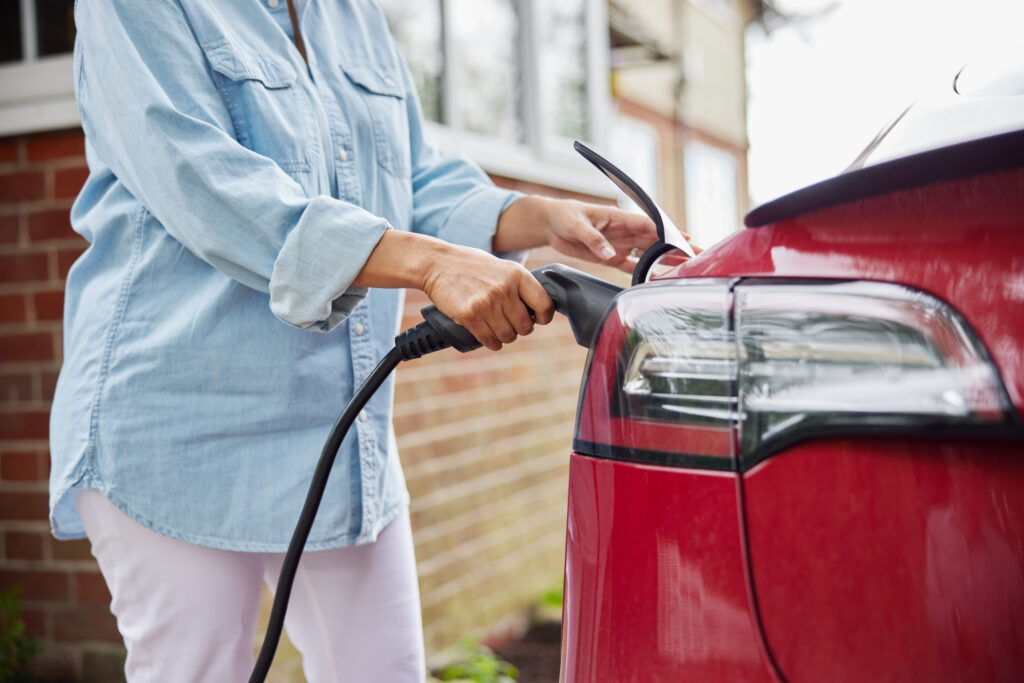

Electric Vehicle (EV) Charger Installation

Electric vehicles (EVs) are a huge investment. They offer countless perks and set you on a path to smarter, more cost-effective living. With EVs comes the question of the right EV charging solution, and options can feel overwhelming with the different charging levels.
That’s why Solera Energy offers superior EV charger services, specializing in faster, more efficient charging solutions. Our advanced charging options help combat range limits, simplify your daily routine, and maximize the benefits of EV ownership.
Types of EV Chargers
Our team will guide you to the perfect charger for your vehicle and lifestyle, whether you drive a Tesla, Nissan, Volvo, or any other EV. Here’s what you need to know about the three levels of EV charging:
- Level 1: This is the standard option most vehicles come with. It uses your home’s existing 120V outlets and is ideal for overnight charging and occasional-use vehicles. While slow (3-6 miles of range/hour), it requires no special installation, making it an easy, cost-effective solution for many homeowners.
- Level 2: Wallbox chargers, a sweet spot for most EV owners. These wall-mounted units use a 240V circuit, delivering speeds 4 to 8 times faster than Level 1 (around 35 miles of range per hour). They require professional installation but offer the perfect balance of speed and convenience for daily charging at home.
- Level 3: Also known as DC fast chargers, these units can add 3 to 20 miles of range per minute. They’re typically found at commercial charging stations due to their high power requirements and aren’t suitable for home installation.
Level 1 or Level 2 chargers are recommended for home use. Our specialists will assess your electrical system, discuss your charging needs, and help you choose the best option.
Benefits of EV Chargers
EV chargers are soaring in popularity amongst homeowners who discover their numerous benefits, including:
- Increased property value: On average, homes with EV chargers were found to sell for $2,500 more than those without, according to a 2019 University of California study.
- Battery storage: EV chargers with bidirectional charging capabilities allow you to charge your vehicle or send energy back to your home or the power grid. This means you can use your EV to power your home during a grid outage or store unused energy generated by your solar panels.
- Convenient home charging: Charge your vehicle overnight, in the comfort of your home, instead of relying on public charging stations.
- Customizable charging schedules: Scheduled charging is a smart feature that automatically charges your EV during off-peak hours to take advantage of lower energy rates while ensuring your vehicle is ready when you need it.
- Reduced carbon footprint: Electric cars produce zero tailpipe emissions and significantly less CO2, even when accounting for electricity generation, especially when used with clean energy sources like solar.
EV Charger Installation Process

Our trained technicians make EV charger installation a fast, seamless experience, handling everything from initial consultation to final testing.
We assess your home’s electrical system and make any necessary upgrades to ensure safe and reliable operation. Your new level-2 EV charger may require up to 80 amps, and your breaker may need to be upgraded to run on 100 or 200 amp service to avoid overloads. Then, we will install a dedicated 240V circuit.
You can choose between having your charger hardwired or installing a NEMA 14-50 outlet with a plug-in charger. A hardwired setup is recommended for a more stable connection and faster charging speeds, though you may opt for an outlet and plug-in charger if you anticipate eventually needing to move the charger.
Installation is typically done in just a few hours, after which we test the system and provide a comprehensive walkthrough, ensuring you’re fully equipped to enjoy your new, quality home charging solution.
EV Charger Maintenance & Repair
EV chargers are designed to be low-maintenance, requiring minimal tune-ups and infrequent repairs. Our maintenance and repair specialists conduct annual checkups to ensure everything is properly secured, cleaned, and connected, addressing potential issues before they escalate. If repairs are needed, our trained technicians swiftly diagnose and fix problems, adhering to strict quality standards and guaranteeing reliable service.
Why Choose Solera Energy for Your Solar EV Charger Services?
As Missouri’s first solar company, Solera Energy is your trusted partner for EV charging solutions and premium solar services. We offer custom solutions for every EV owner, including expert installation, maintenance, and repair services for all levels of EV chargers. Start your journey toward efficient, cost-effective home charging with Solera Energy.
Contact us now to learn how Solera can enhance your home’s EV charging capabilities.
Frequently Asked Questions
Yes. By combining a home EV charger with solar panels, you can virtually eliminate the cost of fueling your vehicle while greatly lowering your carbon footprint by relying on clean solar energy. Your EV may charge more slowly in extreme weather, battery life, and the age and condition of your vehicle. On average, an EV uses about 350 kWh per month, which may add about $50 to your monthly utility bill if not used with solar panels. Can an EV charger be used with solar panels?
What can affect EV charging speeds?
How much electricity does an electric vehicle use?
Here’s Why Our Customers Love Us


